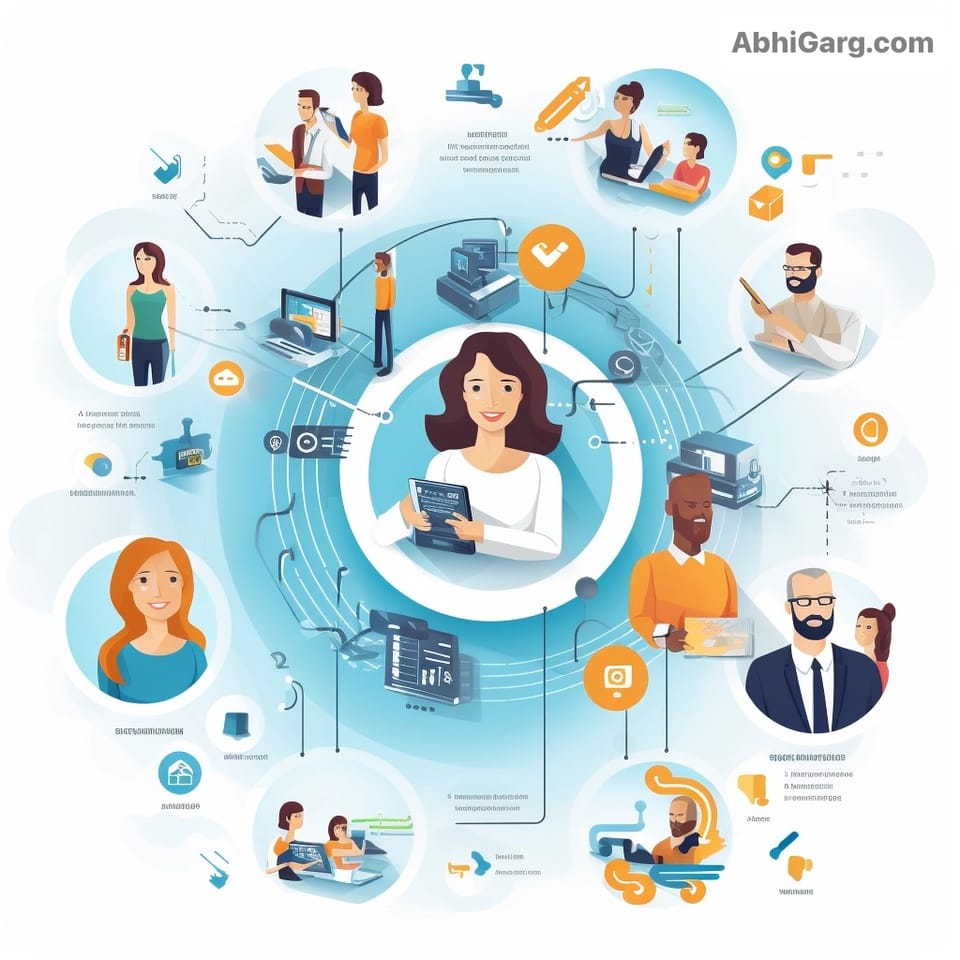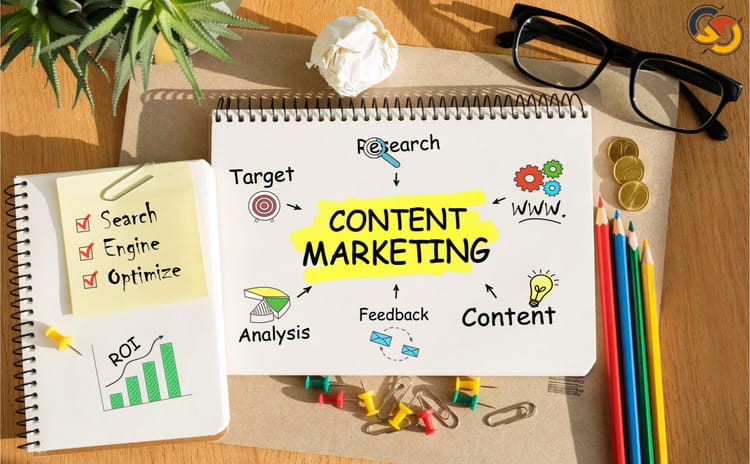The Best Marketing CRM Systems of 2024: An In-Depth Guide

Introduction
In the dynamic world of digital marketing, the phrase "know your customer" has never been more pertinent. With businesses vying for attention in an increasingly crowded digital space, the key to standing out is reaching your audience and profoundly understanding and connecting with them. This is where Customer Relationship Management (CRM) systems become a game-changer.
Here’s the deal: CRM in marketing isn't just about managing your interactions with customers; it's about fostering relationships that turn one-time buyers into loyal brand advocates. A study revealed that implementing a CRM system can increase sales by up to 29%, boost sales productivity by 34%, and improve forecast accuracy by 42%. Astonishing.
This comprehensive guide will delve into the best marketing CRM systems available today. We're not just talking about a list of famous names; we aim to provide an insightful journey through what makes these systems indispensable for modern marketing strategies. From the quintessential features that define a top-tier marketing CRM to real-world applications and success stories, this article is your roadmap to understanding and selecting a CRM system that aligns perfectly with your marketing needs.
Whether you're a small startup or a sprawling enterprise, the insights shared here will prepare you to make an informed decision, ensuring your marketing efforts resonate profoundly and effectively with your target audience.
Understanding CRM in Marketing
What’s the bottom line regarding Customer Relationship Management (CRM) in marketing? It's about creating a centralized system that tracks interactions and transactions and builds a 360-degree view of the customer journey. This comprehensive understanding is pivotal in crafting personalized marketing strategies that resonate with each unique customer.
First, we have to agree on what precisely a Marketing CRM is. At its core, a Marketing CRM is a technology platform that helps businesses manage, analyze, and leverage their interactions with current and potential customers. It's a tool designed to centralize customer data – from basic contact information to detailed engagement history – allowing marketing teams to make informed, data-driven decisions.
Now, how do CRM tools enhance marketing efforts? By offering a multifaceted view of the customer, CRMs enable marketers to tailor their campaigns and communication strategies effectively. This personalized approach improves customer engagement and drives higher conversion rates. Through detailed analytics, CRMs provide insights into customer behavior, preferences, and patterns, empowering marketers to optimize their campaigns for better results.
You might wonder what key features you should look for in a marketing CRM. Here's a rundown of some essential functionalities:
- Customer Data Management: A robust CRM should offer comprehensive capabilities to collect, store, and organize customer data from various touchpoints. This includes demographic information, interaction history, purchasing behavior, and more.
- Segmentation and Targeting: The ability to segment customers into different groups based on specific criteria is crucial. This segmentation allows for more targeted and relevant marketing efforts.
- Campaign Management: Look for CRMs that facilitate creating, managing, and tracking marketing campaigns across multiple channels. Integration with email, social media, and other digital platforms is a plus.
- Lead Management: Effective lead tracking and nurturing functionalities are critical. The CRM should help identify potential leads, track their progress, and nurture them through the sales funnel.
- Analytics and Reporting: The best CRMs offer advanced analytics tools to measure the effectiveness of marketing campaigns, providing insights into ROI, customer engagement, and other vital metrics.
- Integration Capabilities: A great CRM should seamlessly integrate with other tools and systems used by your business, such as sales software, e-commerce platforms, or customer service applications.
The Role of CRM in Modern Marketing Strategies
In today's fast-paced digital landscape, integrating CRM systems with digital marketing is not just a luxury; it's a necessity. Modern CRMs are not standalone tools but central cogs in the marketing machinery intricately woven into various facets of digital marketing strategies.
Integration with Digital Marketing: Now, let's break down the integration aspect. A CRM system acts as a repository of customer information, which, when integrated with digital marketing platforms, enables marketers to launch targeted campaigns. Whether email marketing, social media, or digital advertising, the CRM's rich customer data enhances the precision and effectiveness of these initiatives. It's like having a GPS in the vast wilderness of digital marketing; the CRM data guides marketers to the right audience with the right message at the right time.
Importance in Customer Journey Mapping: CRM systems are crucial in customer journey mapping. They allow marketers to chart the entire customer journey – from awareness and consideration to purchase and loyalty. By analyzing the touchpoints where customers interact with the brand, CRMs help identify critical moments that influence customer decisions. This insight is invaluable in optimizing marketing strategies to provide better customer experiences and nurture long-term relationships.
Data Analytics and Customer Insights: The power of CRM goes beyond mere data collection; it lies in data analytics and the derivation of actionable customer insights. These platforms can process vast amounts of data to reveal patterns and trends. This information is the cornerstone of data-driven marketing – decisions are based not on gut feelings but on concrete data. Understanding customer behaviors, preferences, and pain points allows more effective marketing planning and execution.
Personalization and Targeted Marketing: Want to know the best part? Personalization and targeted marketing are where CRMs genuinely shine. Marketers can create highly personalized communication and offers by leveraging the detailed customer data in CRMs. This level of personalization leads to increased customer engagement, higher conversion rates, and improved customer loyalty. A CRM-equipped marketing strategy ensures customers receive relevant, timely, personalized content, significantly enhancing the overall customer experience.
Evaluating Marketing CRM Solutions
Selecting the best marketing CRM for your business is not just about picking a well-known brand; it's about finding a solution that aligns seamlessly with your unique business needs. Here's a guide to the crucial criteria you should consider to make an informed choice.
User-Friendliness: First and foremost, the CRM you choose should be user-friendly. Remember, the tool will be used by various team members with differing levels of technical expertise. A CRM with an intuitive interface and straightforward navigation ensures quick adoption and minimizes the learning curve. This ease of use is crucial for ensuring your team can fully leverage the CRM's capabilities without being bogged down by complexity.
Customization Options: Every business has its unique processes and requirements. Hence, customization is vital. A good CRM should offer high flexibility to tailor its features to your marketing strategies. This could include custom fields, workflow automation, report formats, and dashboard layouts. The ability to customize ensures that the CRM adapts to your business, not vice versa.
Integration Capabilities: Your CRM should play well with other tools and systems in today's interconnected digital ecosystem. Whether it's your email marketing platform, social media tools, or sales software, seamless integration capabilities are vital. This interconnectedness ensures a unified approach to customer data management and eliminates data silos.
Scalability: Scalability is another critical factor. As your business grows, so do your CRM needs. The ideal CRM should scale with your business, accommodating more users, more extensive databases, and increasing complexity without a hitch.
Support and Training: The availability of robust support and training resources is essential. Good vendor support can significantly affect how effectively you can use the CRM. Look for providers who offer comprehensive training, a responsive support team, and ample resources like tutorials, forums, and documentation.
Cloud-Based vs On-Premise Solutions: Finally, weigh the pros and cons of cloud-based versus on-premise solutions. Cloud-based CRMs are generally more flexible, scalable, and cost-effective, with the advantage of remote accessibility. On-premise solutions, on the other hand, offer more control over the data and system but require a higher upfront investment and ongoing maintenance.
Top Marketing CRM Systems Reviewed
1. Salesforce
Overview: Salesforce is a titan in the CRM world, known for its comprehensive features that cater to various aspects of business operations, including marketing.
Key Features:
- Advanced analytics with AI capabilities.
- Extensive customization options.
- Robust integration with third-party applications.
Pros:
- Highly scalable.
- Wide range of features and functionalities.
Cons:
- It can be overwhelming for beginners.
- Higher cost. Pricing: Varies based on modules selected; generally higher-end. Target Business Size: Mid-market to enterprise. User Reviews and Recognition: Widely acclaimed for its functionality; recognized in numerous industry reports as a leader.
2. HubSpot
Overview: HubSpot is renowned for its user-friendly interface and effectiveness in inbound marketing strategies. Key Features:
- Excellent lead management and nurturing tools.
- Seamless integration with HubSpot's marketing, sales, and service hubs.
- Free CRM option with paid upgrades.
Pros:
- Intuitive and easy to use.
- Robust marketing automation features.
Cons:
- Advanced features can be costly.
- Limited customization in lower-tier plans. Pricing: Freemium model with scalable paid options. Target Business Size: Small to mid-market. User Reviews and Recognition: Highly rated for ease of use and customer support.
3. Zoho CRM
Overview: Zoho CRM is a versatile tool offering a wide range of features at a competitive price. Key Features:
- Good automation capabilities for sales and marketing processes.
- AI-powered sales assistant.
- Extensive customization options.
Pros:
- Affordable pricing.
- Good integration capabilities with other Zoho products.
Cons:
- The user interface could be more intuitive.
- They have limited third-party integrations. Pricing: Ranges from free to premium plans. Target Business Size: Small to mid-market. User Reviews and Recognition: Praised for affordability and feature set.
4. Microsoft Dynamics 365
Overview: A part of Microsoft’s suite of business applications, Dynamics 365 offers deep integration with other Microsoft products. Key Features:
- Robust analytics and reporting tools.
- Seamless integration with Microsoft Office 365.
- AI-driven insights and recommendations.
Pros:
- Highly customizable.
- Robust data security features.
Cons:
- It can be complex to set up and use.
- Higher cost. Pricing: Mid to high range, depending on the modules. Target Business Size: Mid-market to enterprise. User Reviews and Recognition: Recognized for its deep integration capabilities and customizability.
5. Oracle NetSuite CRM
Overview: Oracle NetSuite provides a comprehensive suite beyond traditional CRM capabilities. Key Features:
- Real-time analytics and reporting.
- Robust e-commerce integration.
- Complete customer lifecycle management.
Pros:
- Comprehensive feature set.
- Good scalability.
Cons:
- Steeper learning curve.
- Pricier option. Pricing: Premium pricing. Target Business Size: Mid-market to enterprise. User Reviews and Recognition: Known for its extensive functionalities and integration capabilities.
6. Pipedrive
Overview: Pipedrive stands out for its simplicity and focus on sales pipeline management. Key Features:
- Intuitive interface centered around sales pipeline management.
- Good email integration and tracking.
- Customizable pipeline stages.
Pros:
- User-friendly for sales teams.
- Effective visual sales pipeline.
Cons:
- Limited functionality for complex marketing campaigns.
- Basic reporting features. Pricing: Affordable with tiered pricing. Target Business Size: Small to mid-market. User Reviews and Recognition: Favored by users for its ease of use and visual pipeline management.
Each CRM system offers unique features and functionalities catering to different business sizes and needs. While Salesforce and Dynamics 365 are more suited for larger enterprises with complex requirements, HubSpot and Pipedrive are excellent choices for small to mid-sized businesses seeking simplicity and effectiveness. Zoho CRM balances functionality and affordability, making it a popular choice for businesses on a budget. Considering the features and how well each CRM aligns with your business goals and processes is essential.
Case Studies and Success Stories
In marketing CRM systems, real-world success stories offer the most compelling evidence of their transformative power. Let's explore a few case studies where businesses have successfully implemented CRM systems, leading to remarkable improvements in their marketing results.
1. Salesforce Success Story: E-commerce Giant's Leap in Customer Satisfaction
- Business: A leading e-commerce platform.
- Implementation: Integrated Salesforce CRM to streamline customer interactions and sales processes.
- Impact: Post-implementation, the company saw a 25% increase in customer satisfaction rates. The CRM's robust analytics tools enabled them to understand customer needs better and tailor their marketing strategies, resulting in a 15% increase in conversion rates.
2. HubSpot Triumph: Tech Startup's Surge in Lead Generation
- Business: A fast-growing tech startup.
- Implementation: Adopted HubSpot for its lead nurturing and marketing automation capabilities.
- Impact: The startup experienced a 40% rise in lead generation within the first quarter post-implementation. HubSpot's seamless integration with their existing tools helped them automate key marketing processes, freeing time to focus on strategic initiatives.
3. Zoho CRM's Success with a Retail Chain: Boosting Sales and Efficiency
- Business: A national retail chain.
- Implementation: Zoho CRM was deployed to unify customer data across multiple locations.
- Impact: The retail chain witnessed a 20% increase in sales and a significant improvement in operational efficiency. Zoho's customizability allowed them to create a tailored solution that matched their unique business model.
4. Microsoft Dynamics 365: Financial Services Firm's Strategic Overhaul
- Business: A multinational financial services corporation.
- Implementation: Implemented Microsoft Dynamics 365 for its advanced analytics and AI capabilities.
- Impact: The firm reported a 30% improvement in customer engagement and a 35% increase in cross-sell opportunities. Dynamics 365's AI-driven insights enabled them to personalize their marketing efforts, leading to higher customer retention.
5. Pipedrive: Real Estate Agency's Organizational Transformation
- Business: A regional real estate agency.
- Implementation: Choose Pipedrive for its intuitive sales pipeline management.
- Impact: The agency achieved a 50% faster lead response time and a 25% increase in closed deals. Pipedrive's visual pipeline interface and accessible tracking features significantly improved their sales team's productivity.
These case studies underscore a successful and effective CRM system's profound impact on a business's marketing outcomes. The benefits are manifold and measurable, from heightened customer satisfaction to increased sales and operational efficiencies.
Trends and Future of Marketing CRM
As we look towards the horizon of marketing CRM technology, a few emerging trends stand out, shaping the future of how businesses engage with their customers.
Emerging Trends in CRM Technology:
- AI and Machine Learning: Integrating Artificial Intelligence (AI) and Machine Learning (ML) into CRM systems revolutionizes customer relationship management. These technologies enable predictive analytics, allowing businesses to anticipate customer needs and behaviors. For instance, AI-driven chatbots and virtual assistants are becoming commonplace, offering personalized customer interactions at scale.
- Automation: Automation in CRM is streamlining mundane tasks such as data entry, lead tracking, and even complex marketing campaigns. This shift increases efficiency and frees marketers to focus on more strategic and creative tasks.
- Personalization at Scale: With advancements in data analytics and AI, CRMs enable hyper-personalized customer experiences. Businesses can now tailor their marketing efforts to individual customer preferences at a scale previously unattainable.
Future Outlook:
- Enhanced Customer Experience: The future of CRM is customer-centric. The next wave of CRM systems will likely focus on enhancing the customer experience, using sophisticated analytics to provide deeper insights into customer behavior.
- Seamless Integration with Emerging Technologies: As new technologies emerge, CRM systems will evolve to integrate seamlessly with them. This includes advancements in IoT (Internet of Things), augmented reality (AR), and virtual reality (VR), offering new avenues for customer engagement.
- Ethical Use of Data and Privacy: As data becomes the lifeblood of CRM, ethical considerations and privacy concerns will take center stage. Future CRMs will need to balance the power of data analytics with responsible data management and compliance with evolving privacy laws.
Making the Right CRM Choice for Your Business
Selecting the right CRM system for your business is a decision that requires careful consideration of your unique needs and goals. Here are some final tips to ensure you choose one that aligns well with your business requirements and sets you up for success.
Aligning Business Needs with the Right CRM:
- Assess Your Specific Requirements: Understand your business processes, customer engagement strategies, and what you aim to achieve with the CRM. Do you need advanced analytics, a focus on sales automation, or a simple, user-friendly interface? Each business will have different priorities.
- Consider Your Team's Skill Level: Choose a CRM that matches the technical expertise of your team. A complex system may offer more features, but it's only beneficial if it's easy for your team to use effectively.
- Budget Considerations: Be realistic about your budget. Consider the initial and ongoing expenses such as maintenance, upgrades, and additional features.
Importance of Trial Periods and Demos:
- Test Before You Invest: Take advantage of trial periods and demos. They are invaluable for getting a feel for how the CRM works and how it fits with your business processes.
- Gather Team Feedback: Involve your team in the trial process. Their feedback can be crucial in determining how well the CRM meets your practical needs.
Final Tips for Successful CRM Implementation and Usage:
- Plan for a Gradual Rollout: Implement the CRM system in phases. A gradual rollout allows smoother adoption and provides opportunities to address any issues.
- Invest in Training: Ensure your team is well-trained on how to use the CRM. Proper training can dramatically improve the effectiveness of the system.
- Stay Open to Adjustments: Be prepared to adjust as you go. As your business evolves, your CRM usage needs to grow.
Conclusion
The journey we've embarked on in this guide underscores the undeniable importance of choosing the proper marketing CRM for your business. It's a choice beyond mere software selection; it's about finding a partner in growth, a catalyst for customer connection, and a powerhouse for data-driven marketing strategies.
As we've navigated through various CRM options, from the feature-rich giants like Salesforce to the intuitive and agile solutions like HubSpot and Pipedrive, one thing remains clear: there is no one-size-fits-all solution. Each business has its unique set of needs, goals, and challenges. Therefore, evaluating these specific requirements before deciding is not just advisable; it's imperative.
Remember, the right CRM can transform your marketing landscape, turning data into insights, leads into customers, and interactions into long-lasting relationships. It's an investment in understanding and serving your customers better, a step towards meeting and exceeding their expectations.



